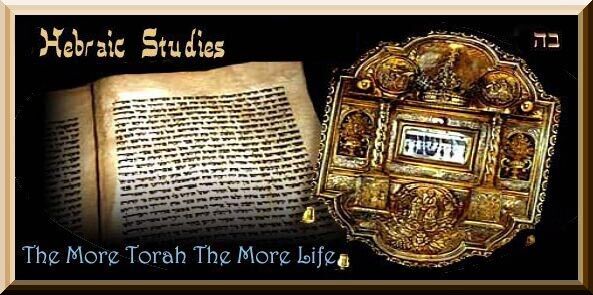
Hebraic
Studies - Haftarah Eikev
Please Note: Firefox and some other Search Engines may not be suitable
Use Google Chrome for this Web Page to load perfectly!

Please do NOT
visit this site on Shabbat or on a
On this site I will
mostly use a version based on the “Jewish Publication
Society”
With
Please Note: On this page I will
show the four letter blessed *“Memorial Name” of
the Almighty in Ivrit - ![]() - Y-H-V-H, which we usually
pronounce as “Adonai” or “HaShem”.
At all times treat the most blessed Name with sanctity and when
we even see the Name, we should say “blessed be His
Sanctified Name.”
- Y-H-V-H, which we usually
pronounce as “Adonai” or “HaShem”.
At all times treat the most blessed Name with sanctity and when
we even see the Name, we should say “blessed be His
Sanctified Name.”
*“This is My Name forever, and this is My memorial to all generations.” Shemoth - Exodus 3:15.
![]()
The Torah Reading
this Shabbat is; Davarim - Deuteronomy 7:12 to 11:25.
The Haftarah reading is; Yeshayahu - Isaiah 49:14 to 51:3.
“But ![]() hath
forsaken me, and
hath
forsaken me, and ![]() hath forgotten me’”. Yeshayahu
- Isaiah 49:14. (JPS).
hath forgotten me’”. Yeshayahu
- Isaiah 49:14. (JPS).
Yeshayahu lived during the exile of the
Israelites in
Much of
“Can a woman forget her sucking child,
that she should not have compassion on the son of her womb?”
Yeshayah asks in chapter 49 verse 15, really speaking to the very
point that Elohim could never forget the Children of Israel.
“Thus saith ![]() Elohim: Behold, I
will lift up My hand to the nations, and set up Mine ensign to
the peoples, and they shall bring thy sons in their bosom, and
thy daughters shall be carried upon their shoulders” Yeshayahu
- Isaiah 49:22.
Elohim: Behold, I
will lift up My hand to the nations, and set up Mine ensign to
the peoples, and they shall bring thy sons in their bosom, and
thy daughters shall be carried upon their shoulders” Yeshayahu
- Isaiah 49:22.
This sense of intensity is strengthened when, in the middle of the haftarah, Yeshayahu uncharacteristically switches to a first-person perspective, describing his own personal relationship with Elohim as he states;
“![]() Elohim hath given me the tongue of
them that are taught, that I should know how to sustain with
words him that is weary; He wakeneth morning by morning, He wakeneth
mine ear to hear as they that are taught” Yeshayahu - Isaiah
50:4.
Elohim hath given me the tongue of
them that are taught, that I should know how to sustain with
words him that is weary; He wakeneth morning by morning, He wakeneth
mine ear to hear as they that are taught” Yeshayahu - Isaiah
50:4.
Yeshayahu then describes how being a prophet
has made him suffer because his listeners sadly do not always
appreciate the message he has to deliver “I hid not my
face from shame and spitting” (Yeshayahu 50:6), but Yeshayahu
is confident that Elohim is on his side, “Behold, ![]() Elohim
will help me” (Yeshayahu - Isaiah 50:9).
Elohim
will help me” (Yeshayahu - Isaiah 50:9).
Switching back to his usual prophetic stance in the final verses of the haftarah, Yeshayahu returns to the image of Elohim and the Jewish people as two companions who’ve been through a rough history, have reconciled, and are now prepared to face the future together.
“For ![]() hath comforted
hath comforted
Yeshayahu preaches, and concludes with a
promise of an impending joy in
“…joy and gladness shall be found
therein, thanksgiving, and the voice of melody (the sound of
music)” Yeshayahu - Isaiah 51:3.
![]()
Wishing you and your Mishpachah or Mesbucha
(family) “Shabbat Shalom”, may the Peace of the
Almighty fill you, your family and your home!
Return to our MAIN PAGE or go to our Main Index
![]()

Please Note: On this page I will
show the four letter blessed *“Memorial Name” of
the Almighty in Ivrit - ![]() - Y-H-V-H, which we usually
pronounce as “Adonai” or “HaShem”.
At all times treat the most blessed Name with sanctity and when
we even see the Name, we should say “blessed be His
Sanctified Name.”
- Y-H-V-H, which we usually
pronounce as “Adonai” or “HaShem”.
At all times treat the most blessed Name with sanctity and when
we even see the Name, we should say “blessed be His
Sanctified Name.”
*“This is My Name forever, and this is My memorial to all generations.” Shemoth - Exodus 3:15.
-hebraicstudies.com-
Email us
© Copyright - 1989 - 2021 © hebraicstudies - All rights reserved